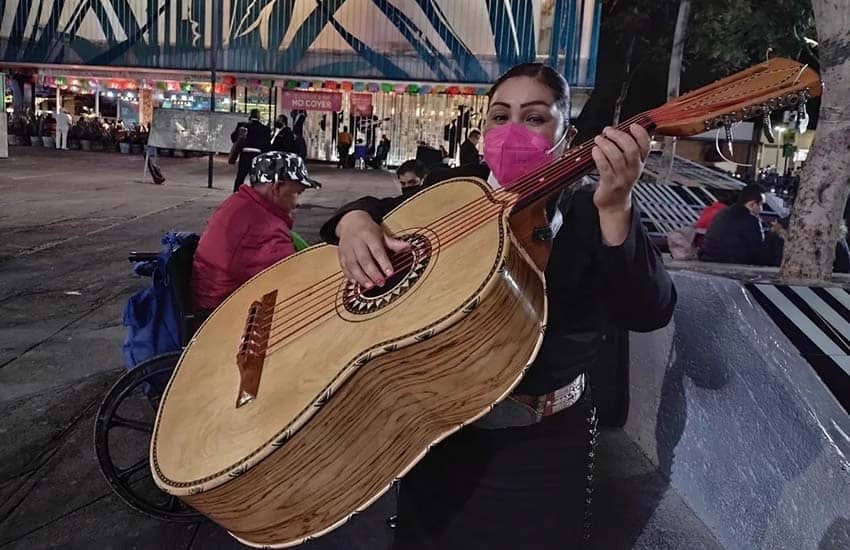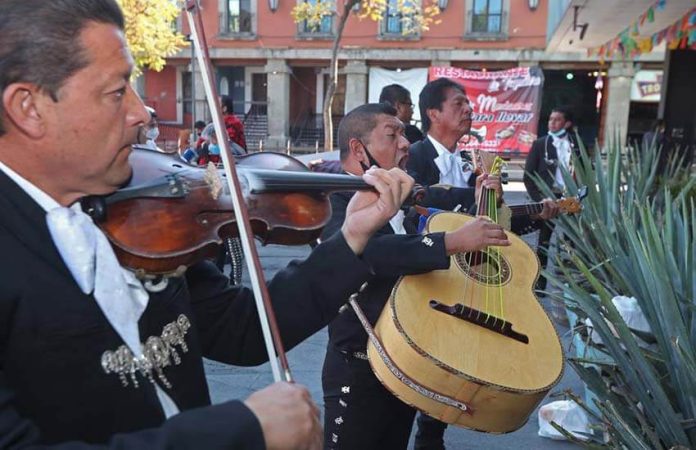Mexico City’s mariachi musicians are more affected than most by the pandemic, losing a substantial portion of their income and scores of their colleagues since the virus reached Mexico early last year.
Despite the downturn in demand for their services, groups of musicians continue to make their way to Plaza Garibaldi – the capital’s mariachi mecca – night after night in search of paying customers celebrating events such as birthdays, anniversaries and engagements; mourning the loss of a family member of friend; or just looking for a good time.
But for the past 18 months, such people have been few and far between, especially compared to the heady days of pre-pandemic life.
Speaking to a reporter from the newspaper El Economista, a mariachi guitarist maintained his sense of humor. He joked that fewer people are coming to the square because all the musicians are wearing face masks and potential customers can’t see how handsome they are.
“They don’t come because you frighten them away, loco,” countered one of his fellow musicians.

Jokes aside, the pandemic has hit the iconic musicians hard. Guadalupe Sánchez, a female mariachi and single mother who began her career as a professional musician just a few months before the pandemic began, told El Economista that groups were forced to lower their prices last year to get would-be customers to part with their cash.
A song would go for 150 pesos (US $7.50) in pre-pandemic times, but mariachi groups – who commonly have to split their earnings between six or seven members – had to lower their prices to 120 pesos or even 100 pesos last year, she said.
Hour-long visits to play at people’s homes previously cost 2,500 or 3,000 pesos (US $125 to $150), but the going rate now is just 1,800, Sánchez added,
As for revelers in Plaza Garibaldi – which attracts Mexico City locals as well as interstate and international visitors – the numbers are up slightly compared to the peak of the coronavirus outbreak last year but still well below pre-pandemic times.
“[Things] are getting better little by little,” Sánchez said. “But look now: there’s nothing and nobody has hired us for the Fiestas Patrias,” she said, referring to the Independence Day holidays.
Fernando Carmona Coronel, a trumpeter, third-generation mariachi and leader of a musicians’ union, said mariachis intend to ask the Mexico City government to launch a promotional campaign for Plaza Garibaldi in order to attract more business.
“… We are intangible cultural heritage,” he said, referring UNESCO’s designation for mariachi musicians in 2011. “We have to preserve this tradition that is an essential part of the life of Mexicans.”
Carmona also indicated that his union will ask for the government’s help to offer better working conditions to musicians, who typically don’t have access to social security and other benefits afforded to formal sector workers.
“We hope things pick up on the 15th [of September],” one young mariachi told El Economista.
But even if large numbers of Mexicans do descend on Plaza Garibaldi and the bars around it to celebrate the 200th anniversary of independence from Spain, a dark cloud will still hang over the square. More than 100 mariachis have died from COVID-19, Carmona said.
Mariano Gutiérrez, a 40-year veteran of the Plaza Garibaldi mariachi scene, was luckier than some and managed to survive his bout with the disease.
“When I first got symptoms, I went to the health center and they sent me to a hospital and to get a test. I went and I tested positive, but as I wasn’t doing too badly, they sent me home. In the following days, I felt really bad. [I had] difficulty breathing more than anything,” said the 56-year-old violinist, who has given up singing due to the lingering effects of his illness.

“[But] I thought, ‘This fucking disease isn’t going to stop me from reaching 50 years of [performing] music,’” Gutiérrez said, adding that he sought treatment that ended up costing him 20,000 pesos (US $1,000). “And I did well — because a relative who got sick spent more than 30,000.”
His resilience and positivity in the face of adversity amid a long and devastating pandemic are shared by many of his colleagues.
“It’s been very difficult, [but] we’re going to get through it,” Carmona said. “The music, the happiness of the people and even their sadness give us the energy to go on.”
With reports from El Economista
